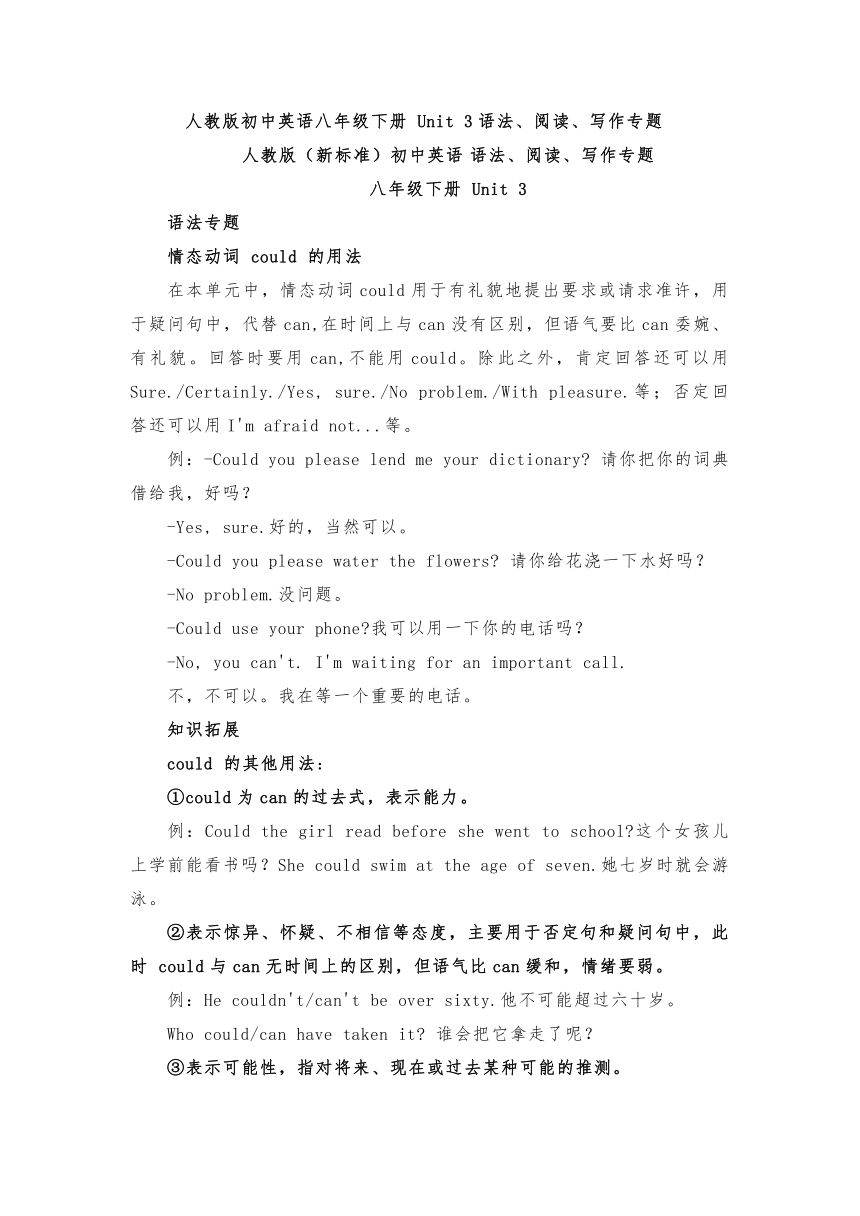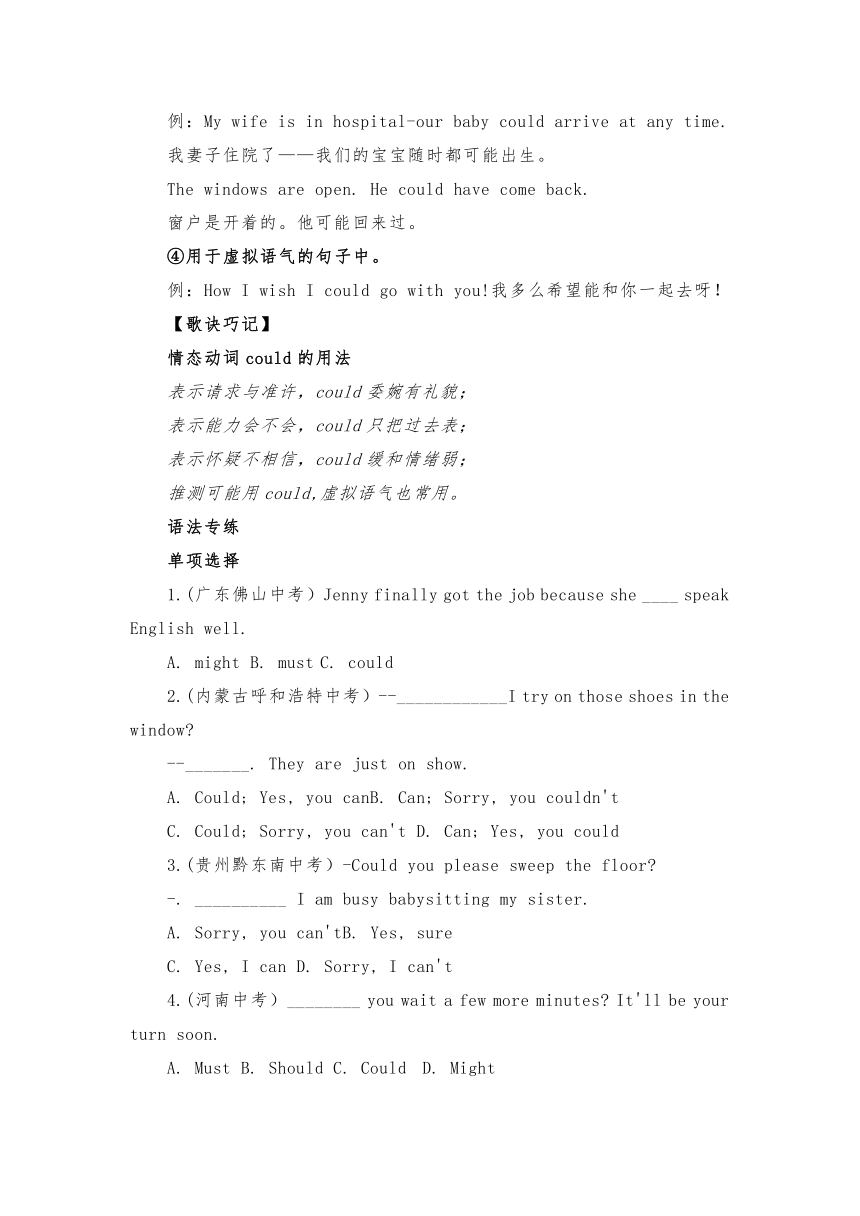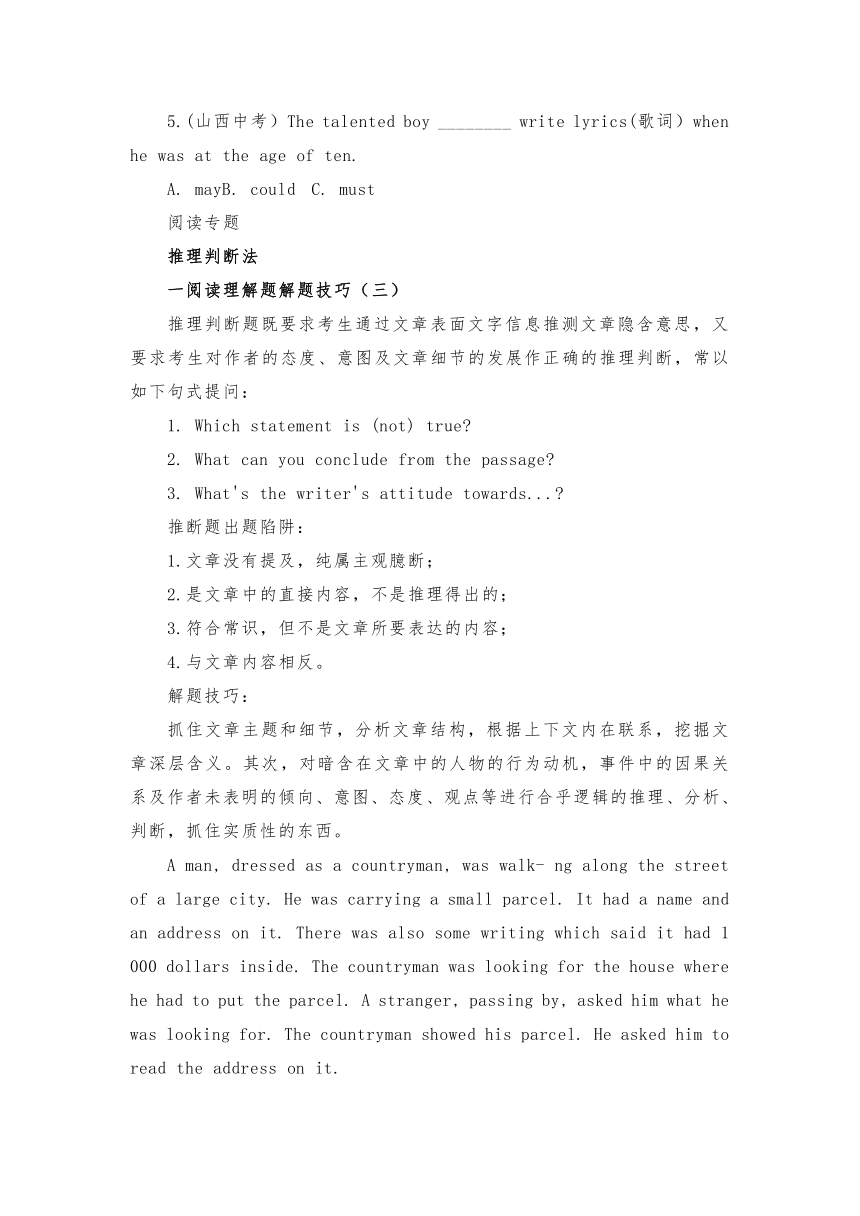人教版初中英语八年级下册 Unit 3 Could you please clean your room? 语法、阅读、写作专题(含答案)
文档属性
| 名称 | 人教版初中英语八年级下册 Unit 3 Could you please clean your room? 语法、阅读、写作专题(含答案) |

|
|
| 格式 | zip | ||
| 文件大小 | 19.9KB | ||
| 资源类型 | 教案 | ||
| 版本资源 | 人教新目标(Go for it)版 | ||
| 科目 | 英语 | ||
| 更新时间 | 2023-03-29 00:00:00 | ||
图片预览



文档简介
人教版初中英语八年级下册 Unit 3语法、阅读、写作专题
人教版(新标准)初中英语 语法、阅读、写作专题
八年级下册 Unit 3
语法专题
情态动词 could 的用法
在本单元中,情态动词could用于有礼貌地提出要求或请求准许,用于疑问句中,代替can,在时间上与can没有区别,但语气要比can委婉、有礼貌。回答时要用can,不能用could。除此之外,肯定回答还可以用Sure./Certainly./Yes, sure./No problem./With pleasure.等;否定回答还可以用I'm afraid not...等。
例:-Could you please lend me your dictionary 请你把你的词典借给我,好吗?
-Yes, sure.好的,当然可以。
-Could you please water the flowers 请你给花浇一下水好吗?
-No problem.没问题。
-Could use your phone 我可以用一下你的电话吗?
-No, you can't. I'm waiting for an important call.
不,不可以。我在等一个重要的电话。
知识拓展
could 的其他用法:
①could为can的过去式,表示能力。
例:Could the girl read before she went to school 这个女孩儿上学前能看书吗?She could swim at the age of seven.她七岁时就会游泳。
②表示惊异、怀疑、不相信等态度,主要用于否定句和疑问句中,此时 could与can无时间上的区别,但语气比can缓和,情绪要弱。
例:He couldn't/can't be over sixty.他不可能超过六十岁。
Who could/can have taken it 谁会把它拿走了呢?
③表示可能性,指对将来、现在或过去某种可能的推测。
例:My wife is in hospital-our baby could arrive at any time.
我妻子住院了——我们的宝宝随时都可能出生。
The windows are open. He could have come back.
窗户是开着的。他可能回来过。
④用于虚拟语气的句子中。
例:How I wish I could go with you!我多么希望能和你一起去呀!
【歌诀巧记】
情态动词could的用法
表示请求与准许,could委婉有礼貌;
表示能力会不会,could只把过去表;
表示怀疑不相信,could缓和情绪弱;
推测可能用could,虚拟语气也常用。
语法专练
单项选择
1.(广东佛山中考)Jenny finally got the job because she ____ speak English well.
A. might B. must C. could
2.(内蒙古呼和浩特中考)--____________I try on those shoes in the window
--_______. They are just on show.
A. Could; Yes, you canB. Can; Sorry, you couldn't
C. Could; Sorry, you can't D. Can; Yes, you could
3.(贵州黔东南中考)-Could you please sweep the floor
-. __________ I am busy babysitting my sister.
A. Sorry, you can'tB. Yes, sure
C. Yes, I can D. Sorry, I can't
4.(河南中考)________ you wait a few more minutes It'll be your turn soon.
A. Must B. Should C. Could D. Might
5.(山西中考)The talented boy ________ write lyrics(歌词)when he was at the age of ten.
A. mayB. could C. must
阅读专题
推理判断法
一阅读理解题解题技巧(三)
推理判断题既要求考生通过文章表面文字信息推测文章隐含意思,又要求考生对作者的态度、意图及文章细节的发展作正确的推理判断,常以如下句式提问:
1. Which statement is (not) true
2. What can you conclude from the passage
3. What's the writer's attitude towards...
推断题出题陷阱:
1.文章没有提及,纯属主观臆断;
2.是文章中的直接内容,不是推理得出的;
3.符合常识,但不是文章所要表达的内容;
4.与文章内容相反。
解题技巧:
抓住文章主题和细节,分析文章结构,根据上下文内在联系,挖掘文章深层含义。其次,对暗含在文章中的人物的行为动机,事件中的因果关系及作者未表明的倾向、意图、态度、观点等进行合乎逻辑的推理、分析、判断,抓住实质性的东西。
A man, dressed as a countryman, was walk- ng along the street of a large city. He was carrying a small parcel. It had a name and an address on it. There was also some writing which said it had 1 000 dollars inside. The countryman was looking for the house where he had to put the parcel. A stranger, passing by, asked him what he was looking for. The countryman showed his parcel. He asked him to read the address on it.
"I have forgotten it. That's my name and address. It's my parcel. It's from my old friend, Bob. He promised to send it to me a week ago.
The countryman looked pleased to hear this." Take it if it's yours," he said. "But you must give me 60 dollars for my trouble. "The stranger did so. After the countryman left, the stranger went to a quiet place to look at the parcel. Inside, there was nothing but some pieces of torn cloth.
What's the feeling of the stranger
A. Angry. B.Regretful. C.Bad. D. Surprised
解析:通读文章可知,这个陌生人用60美元换了一个装满破布的包裹,他意识到他不但没骗到乡下人的钱,反而被对方所骗,应该会很生气。
写作专题
【写作话题】
本单元围绕“做家务”展开话题。做家务是生活的一部分,更加贴近学生的生活。通过小组对话、讨论等一系列课堂活动,学生们把所学的语言知识与生活实际结合起来,使学习过程生活化。
【写作技巧】
在日常生活中,家务事是必不可少的,本单元写作要求学生通过观察和亲身实践,讨论做家务的必要性,和你所做的家务以及你对做家务的看法。
常用于这类作文的句型有:
-Could you please take out the rubbish
-Yes, sure.
I think doing chores is not so difficult.
I think it is important for children to learn how...
The earlier kids learn to be independent, the better...
【写作应用】
你平时在家里干家务吗?都做哪些家务?你认为孩子们在家里应该做家务吗?孩子在家做家务父母需要给报酬吗?谈谈你的看法。
提示:1.内容:你所做的家务以及你对做家务的看法;
2.词数:80以上;
写作模板
1. 开头—论点,自己所做的家务
I believe it is necessary for us to do some chores. I often help my parents wash the dishes, sweep the floor, make the bed,
2. 中间——论据,表达自己的观点及原因
3. 结尾---结论,重申自己的观点,回扣主题
Every family has a lot of chores. I have my own idea of whether students should do chores or not. I believe it is necessary for us to do some chores. I often help my parents wash the dishes, sweep the floor, make the bed, sometimes I fold the clothes and take out the trash.
Although I often help my parents do chores, I don’t think we should get money by doing chores. Because it is a good chance to develop our independence and teaches us how to look after ourselves. Besides, doing chores can help us get closer to our family. It also helps us to understand importance of sharing and fairness. What’s more, as a family member, it’s our job to provide a clean and comfortable environment for our family.
All in all, I am willing to(乐意) help my parents do chores without any money.
语法专练参考答案与解析
1.C might为may的过去式,意为“可能,可以”;must意为“必须,一定”;could为can的过去式,意为“能够”。根据主句意思“珍妮最终得到了那份工作”可知,从句意思为“因为她英语说得很好”,故选C。
2.C句意:“我可以试穿橱窗里的那双鞋吗?”“对不起,你不能。它们只用来陈列。”此问句为有礼貌地请求准许的结构,回答时只能用can,而不能用could,故可排除B、D两项;由“just on show”可判断为否定回答,故选C。
3.D句意:“请你扫一下地好吗?”“对不起,我不能。我忙着照看我的妹妹。”由后面的“忙着”可知,要作否定回答,故选D。
4.C句意:你能再等几分钟吗?很快就轮到你了。情态动词在此表示委婉语气,故could 符合题意。must“必须,一定”;should“应该”;might“可能,可以”。
5.B may"可以,可能”,表示可能性;could“能够”,表示过去的能力;must“必须”,表示肯定推测。句意:这个天才男孩儿10岁时就能够写歌词。由句意可知,此处表示过去的能力,故选B。
人教版(新标准)初中英语 语法、阅读、写作专题
八年级下册 Unit 3
语法专题
情态动词 could 的用法
在本单元中,情态动词could用于有礼貌地提出要求或请求准许,用于疑问句中,代替can,在时间上与can没有区别,但语气要比can委婉、有礼貌。回答时要用can,不能用could。除此之外,肯定回答还可以用Sure./Certainly./Yes, sure./No problem./With pleasure.等;否定回答还可以用I'm afraid not...等。
例:-Could you please lend me your dictionary 请你把你的词典借给我,好吗?
-Yes, sure.好的,当然可以。
-Could you please water the flowers 请你给花浇一下水好吗?
-No problem.没问题。
-Could use your phone 我可以用一下你的电话吗?
-No, you can't. I'm waiting for an important call.
不,不可以。我在等一个重要的电话。
知识拓展
could 的其他用法:
①could为can的过去式,表示能力。
例:Could the girl read before she went to school 这个女孩儿上学前能看书吗?She could swim at the age of seven.她七岁时就会游泳。
②表示惊异、怀疑、不相信等态度,主要用于否定句和疑问句中,此时 could与can无时间上的区别,但语气比can缓和,情绪要弱。
例:He couldn't/can't be over sixty.他不可能超过六十岁。
Who could/can have taken it 谁会把它拿走了呢?
③表示可能性,指对将来、现在或过去某种可能的推测。
例:My wife is in hospital-our baby could arrive at any time.
我妻子住院了——我们的宝宝随时都可能出生。
The windows are open. He could have come back.
窗户是开着的。他可能回来过。
④用于虚拟语气的句子中。
例:How I wish I could go with you!我多么希望能和你一起去呀!
【歌诀巧记】
情态动词could的用法
表示请求与准许,could委婉有礼貌;
表示能力会不会,could只把过去表;
表示怀疑不相信,could缓和情绪弱;
推测可能用could,虚拟语气也常用。
语法专练
单项选择
1.(广东佛山中考)Jenny finally got the job because she ____ speak English well.
A. might B. must C. could
2.(内蒙古呼和浩特中考)--____________I try on those shoes in the window
--_______. They are just on show.
A. Could; Yes, you canB. Can; Sorry, you couldn't
C. Could; Sorry, you can't D. Can; Yes, you could
3.(贵州黔东南中考)-Could you please sweep the floor
-. __________ I am busy babysitting my sister.
A. Sorry, you can'tB. Yes, sure
C. Yes, I can D. Sorry, I can't
4.(河南中考)________ you wait a few more minutes It'll be your turn soon.
A. Must B. Should C. Could D. Might
5.(山西中考)The talented boy ________ write lyrics(歌词)when he was at the age of ten.
A. mayB. could C. must
阅读专题
推理判断法
一阅读理解题解题技巧(三)
推理判断题既要求考生通过文章表面文字信息推测文章隐含意思,又要求考生对作者的态度、意图及文章细节的发展作正确的推理判断,常以如下句式提问:
1. Which statement is (not) true
2. What can you conclude from the passage
3. What's the writer's attitude towards...
推断题出题陷阱:
1.文章没有提及,纯属主观臆断;
2.是文章中的直接内容,不是推理得出的;
3.符合常识,但不是文章所要表达的内容;
4.与文章内容相反。
解题技巧:
抓住文章主题和细节,分析文章结构,根据上下文内在联系,挖掘文章深层含义。其次,对暗含在文章中的人物的行为动机,事件中的因果关系及作者未表明的倾向、意图、态度、观点等进行合乎逻辑的推理、分析、判断,抓住实质性的东西。
A man, dressed as a countryman, was walk- ng along the street of a large city. He was carrying a small parcel. It had a name and an address on it. There was also some writing which said it had 1 000 dollars inside. The countryman was looking for the house where he had to put the parcel. A stranger, passing by, asked him what he was looking for. The countryman showed his parcel. He asked him to read the address on it.
"I have forgotten it. That's my name and address. It's my parcel. It's from my old friend, Bob. He promised to send it to me a week ago.
The countryman looked pleased to hear this." Take it if it's yours," he said. "But you must give me 60 dollars for my trouble. "The stranger did so. After the countryman left, the stranger went to a quiet place to look at the parcel. Inside, there was nothing but some pieces of torn cloth.
What's the feeling of the stranger
A. Angry. B.Regretful. C.Bad. D. Surprised
解析:通读文章可知,这个陌生人用60美元换了一个装满破布的包裹,他意识到他不但没骗到乡下人的钱,反而被对方所骗,应该会很生气。
写作专题
【写作话题】
本单元围绕“做家务”展开话题。做家务是生活的一部分,更加贴近学生的生活。通过小组对话、讨论等一系列课堂活动,学生们把所学的语言知识与生活实际结合起来,使学习过程生活化。
【写作技巧】
在日常生活中,家务事是必不可少的,本单元写作要求学生通过观察和亲身实践,讨论做家务的必要性,和你所做的家务以及你对做家务的看法。
常用于这类作文的句型有:
-Could you please take out the rubbish
-Yes, sure.
I think doing chores is not so difficult.
I think it is important for children to learn how...
The earlier kids learn to be independent, the better...
【写作应用】
你平时在家里干家务吗?都做哪些家务?你认为孩子们在家里应该做家务吗?孩子在家做家务父母需要给报酬吗?谈谈你的看法。
提示:1.内容:你所做的家务以及你对做家务的看法;
2.词数:80以上;
写作模板
1. 开头—论点,自己所做的家务
I believe it is necessary for us to do some chores. I often help my parents wash the dishes, sweep the floor, make the bed,
2. 中间——论据,表达自己的观点及原因
3. 结尾---结论,重申自己的观点,回扣主题
Every family has a lot of chores. I have my own idea of whether students should do chores or not. I believe it is necessary for us to do some chores. I often help my parents wash the dishes, sweep the floor, make the bed, sometimes I fold the clothes and take out the trash.
Although I often help my parents do chores, I don’t think we should get money by doing chores. Because it is a good chance to develop our independence and teaches us how to look after ourselves. Besides, doing chores can help us get closer to our family. It also helps us to understand importance of sharing and fairness. What’s more, as a family member, it’s our job to provide a clean and comfortable environment for our family.
All in all, I am willing to(乐意) help my parents do chores without any money.
语法专练参考答案与解析
1.C might为may的过去式,意为“可能,可以”;must意为“必须,一定”;could为can的过去式,意为“能够”。根据主句意思“珍妮最终得到了那份工作”可知,从句意思为“因为她英语说得很好”,故选C。
2.C句意:“我可以试穿橱窗里的那双鞋吗?”“对不起,你不能。它们只用来陈列。”此问句为有礼貌地请求准许的结构,回答时只能用can,而不能用could,故可排除B、D两项;由“just on show”可判断为否定回答,故选C。
3.D句意:“请你扫一下地好吗?”“对不起,我不能。我忙着照看我的妹妹。”由后面的“忙着”可知,要作否定回答,故选D。
4.C句意:你能再等几分钟吗?很快就轮到你了。情态动词在此表示委婉语气,故could 符合题意。must“必须,一定”;should“应该”;might“可能,可以”。
5.B may"可以,可能”,表示可能性;could“能够”,表示过去的能力;must“必须”,表示肯定推测。句意:这个天才男孩儿10岁时就能够写歌词。由句意可知,此处表示过去的能力,故选B。
同课章节目录
- Unit 1 What's the matter?
- Section A
- Section B
- Unit 2 I'll help to clean up the city parks.
- Section A
- Section B
- Unit 3 Could you please clean your room?
- Section A
- Section B
- Unit 4 Why don't you talk to your parents?
- Section A
- Section B
- Unit 5 What were you doing when the rainstorm came
- Section A
- Section B
- Review of Units 1-5
- Unit 6 An old man tried to move the mountains.
- Section A
- Section B
- Unit 7 What's the highest mountain in the world?
- Section A
- Section B
- Unit 8 Have you read Treasure Island yet?
- Section A
- Section B
- Unit 9 Have you ever been to a museum?
- Section A
- Section B
- Unit 10 I've had this bike for three years.
- Section A
- Section B
